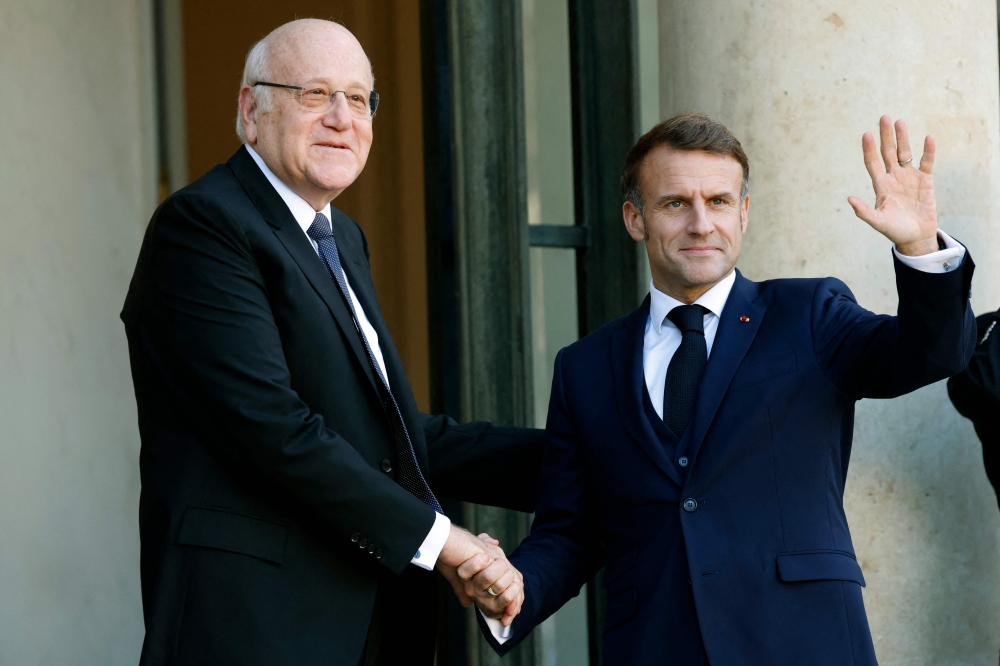Paris conference to save Lebanon on the ‘brink of civil war'
The massive displacement of Lebanese Shia is exacerbating sectarian tensions. The central objective of the conference underway today in Paris is to help Lebanon’s military avoid a bloodbath. This is a first step, a prelude to a possible ceasefire between Hezbollah and Israel, and the deployment of Lebanese armed forces south of the Litani River that will allow the return of the displaced people.
Beirut (AsiaNews) – October in Lebanon is the season of forest fires. In the beautiful pine forest overlooking the coast north of Beirut, the Civil Defence was trying yesterday to extinguish a vast fire with makeshift means, for the third day in a row. Two army helicopters equipped with metal pods are shuttling between the sea and the foothills of Mount Lebanon, to contain the flames that are progressing in the talwegs inaccessible to fire and rescue vehicles.
In Beirut, three days ago, the military had to back Internal Security Forces (ISF) to protect them from projectiles and stones thrown in their direction by displaced people refusing to evacuate, at the request of its owner, a disused hotel on Hamra Street where they had taken up residence.
The military, the backbone of the state, is becoming more and more indispensable in a country "on the verge of collapse", to cite German Foreign Minister Annalena Baerbock, who spoke in Beirut; in fact, a certain nervousness is spreading across the country, as Shias from southern Lebanon realise that they will not be able to return to their devastated villages any time soon, and that their exodus is destined to continue.
It is estimated that the Israeli army drove about 1.2 million Lebanese, mostly Shias, from their homes. More than 250,000 have arrived Iraq, according to informed sources close to the General Security. It is not known exactly how many were able to find rental accommodation, travel to Europe, or find hospitality with relatives.
This nervousness is fed by audiovisual and social media close to the pro-Iranian party, which is accusing Christian parties of treason and defeatism. The latter do not approve of the resistance (Hezbollah) and slam its assassinated leader, Hassan Nasrallah for the adventurism that plunged Lebanon into Israel’s merciless war.
"An imminent civil war?”
According to journalist Sybille Rizk, head of "Koullouna Irada" (We are all resolve), a civic association, "strengthening the Lebanese army is one of the main objectives of the international conference" designed to help Lebanon, which opens today in Paris.
His words echo a recent statement by French Defence Minister Sébastien Lecornu, who fears "an imminent civil war" in Lebanon. For expert Rabih Habre, the first signs of such an alarmist view are already visible here and there, at a time when Lebanon is already cracking under the weight of several hundred thousand illegal displaced Syrians.
Specifically, French President Emmanuel Macron and caretaker Lebanese Prime Minister Nagib Mikati will make opening speeches at the Paris conference. The two men already met Tuesday at the Élysée Palace. The Commander of the Lebanese Armed Forces, General Joseph Aoun, is also set to address the gathering (via videoconference), while French Foreign Minister will host a final press conference.
Representatives of some 70 States, organisations, and funds will attend the conference. Participants are expected to stress the need for an immediate ceasefire followed by an agreement on the immediate implementation of Security Council resolution 1701, which provides for the stationing of 12,000 to 15,000 troops south of the Litani River, alongside UNIFIL troops, and the total withdrawal of Hezbollah from that area.
France is conscious, however, that, despite its presence in southern Lebanon, through UNIFIL, it has little chance of exerting any influence to end the fighting, since Israel imposed unacceptable conditions, like total freedom to fly over Lebanon. “"The United States, on the other hand, can impose it, but do they want to?" is the question being asked at the French embassy in Beirut.
A financial challenge
“France also knows that a deployment of Lebanese troops in 2024 is a financial challenge that Lebanon cannot meet alone," explained a diplomatic source. How can we expect Lebanese troops to do their work south of the Litani in accordance with this resolution when most soldiers are unable to make ends meet and are doing odd jobs on the side? For this reason, we must provide significant financial support to the military to pay for salaries and equipment.”
“It is with this in mind that France is working in Lebanon, based on the notion that its role goes beyond considerations of specific interests and is part of a historical logic," say those who follow the case. The agenda has been drawn up according to real possibilities. A few hundred million dollars are expected to be raised in these circles.
31/05/2018 19:04
03/01/2024 18:54







.png)










